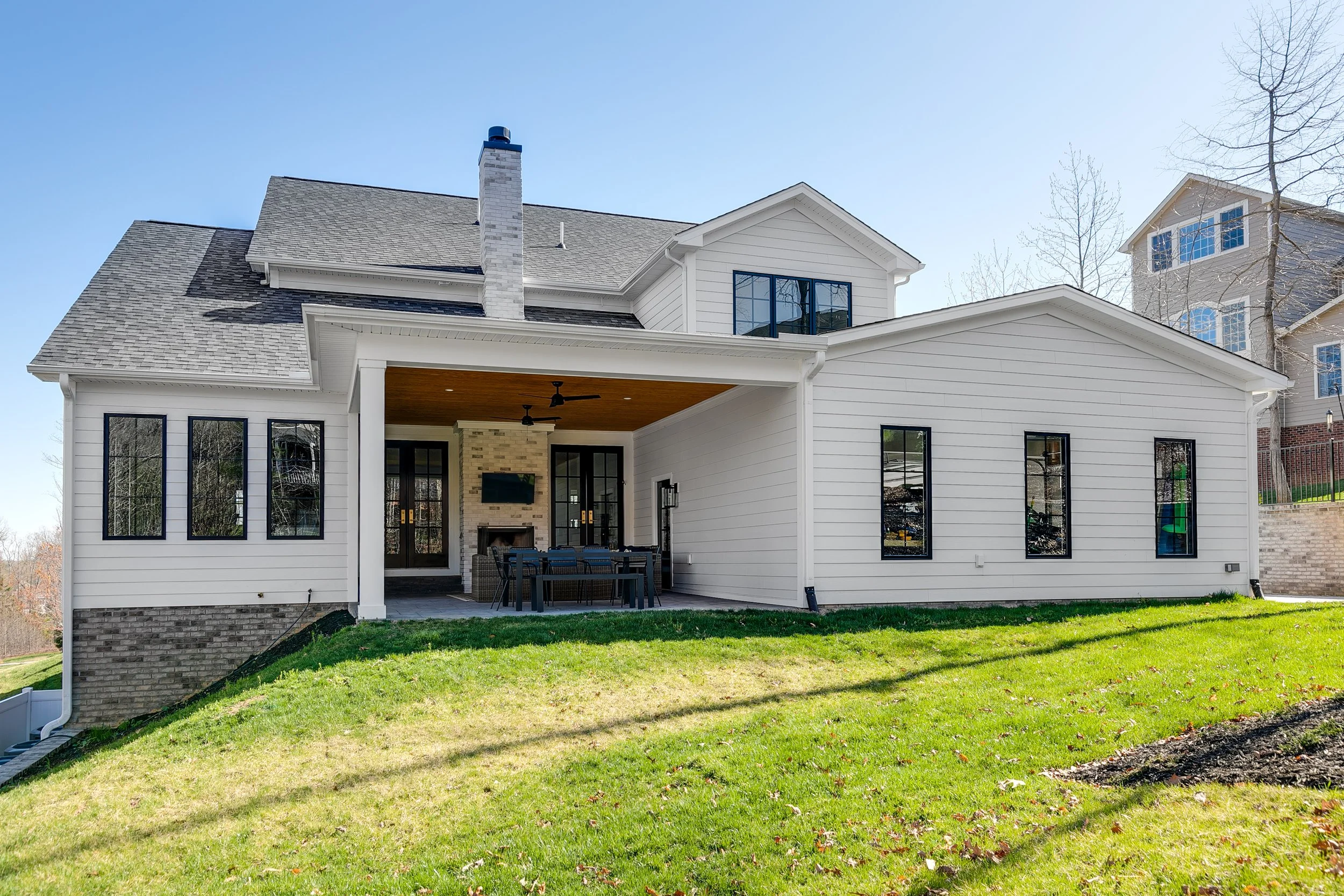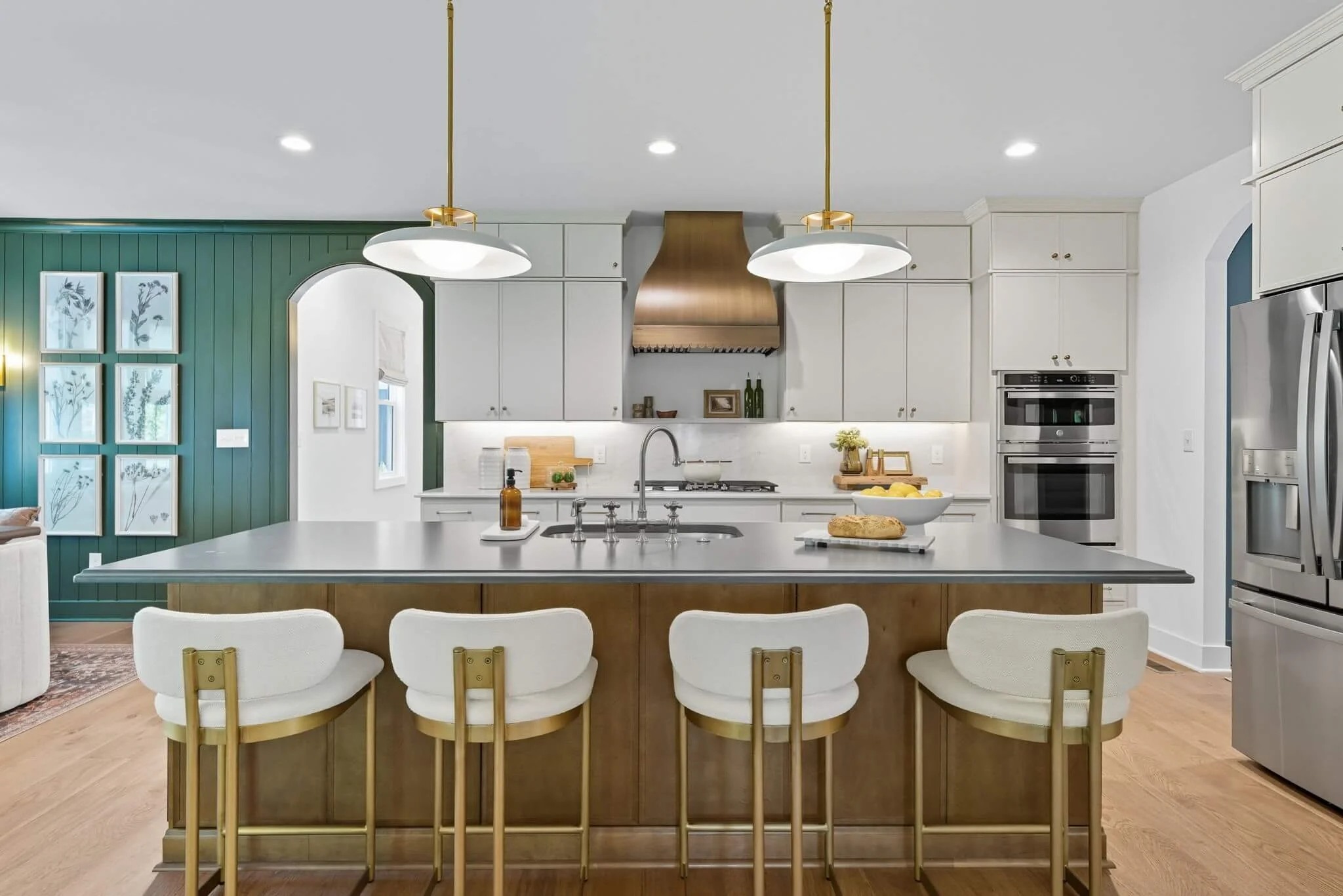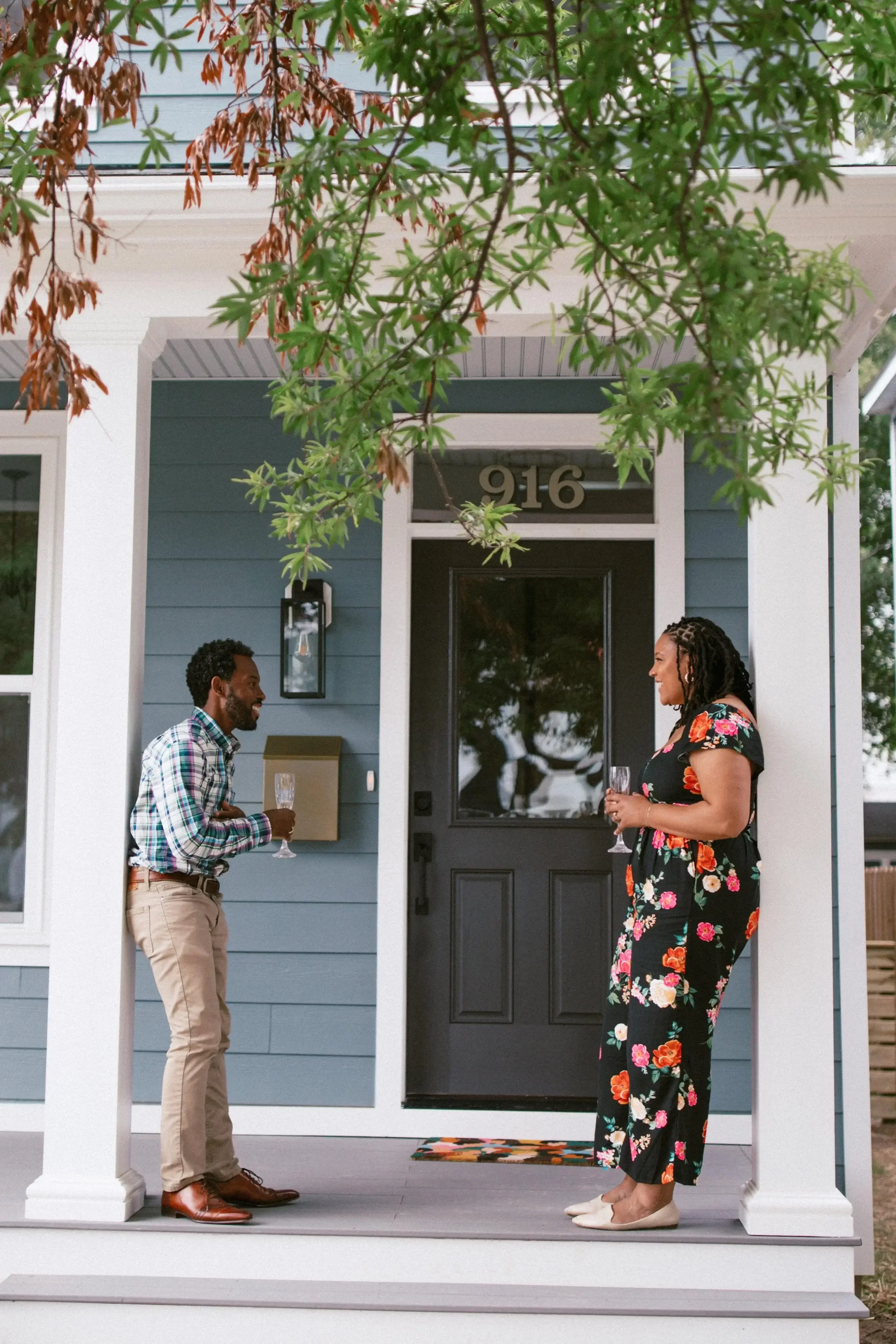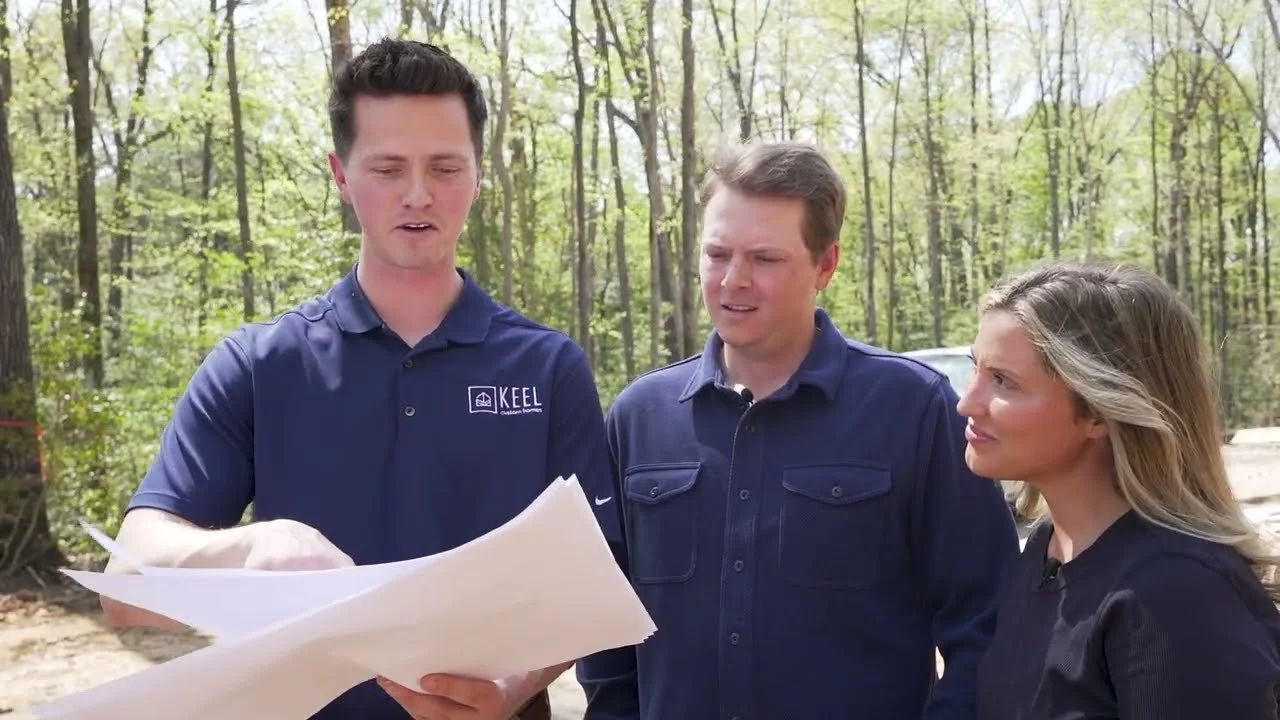10 Reasons Why Richmond Families Choose Build-on-Your-Lot vs. Production Homes
"We just wanted the opportunity to start from scratch," Stephen Godfrey says, standing in what used to be a bedroom on the Sanibel floor plan—but is now a stunning open loft with a floor-to-ceiling fireplace. Six months earlier, he and Kailey had sat across from a production builder who couldn't even move a single wall. The contrast still amazes them. It's a story we hear every week at Keel Custom Homes: Richmond families who thought new construction meant picking Package A, B, or C, suddenly discovering they can actually design the home they've been dreaming about. The question isn't whether you want a new home—it's whether you want their home or yours.
Production homes absolutely have their place. They offer predictability, established communities, and often quicker move-in times. For many buyers, they're the perfect solution. But for Richmond families who want more—more choices, more quality, more control—build-on-your-lot (BOYL) custom homes offer freedoms that production builders simply can't match.
If you're weighing your options for new construction in Central Virginia, understanding these key differences will help you make the right choice for your family. Here are the 10 reasons why more Richmond families are choosing to build custom on their own lots rather than buying production.
Reason #1: You Choose Your Land, Not Theirs
The Production Reality: When you buy a production home, you're limited to wherever that builder owns land. That means choosing from available lots in their developments—if any remain by the time you're ready to buy. Want to live in a specific school district? Hope they're building there. Have your eye on that perfect piece of land in Goochland? Too bad, they only build in their subdivisions.
Production builders often charge lot premiums for "better" locations within their developments—corner lots, cul-de-sacs, or those backing to trees. You're competing with other buyers for these preferred spots, sometimes entering lottery systems or paying tens of thousands extra for marginally better positioning within the same subdivision.
The BOYL Advantage: With build-on-your-lot custom homes, the entire Richmond region becomes your canvas. Build on family land that's been waiting for the right time. Find that perfect acre in Powhatan where your kids can roam. Select a lot in your preferred school district. Choose between established neighborhoods or rural settings based on your lifestyle, not their inventory.
With Keel, you can build on your own lot or find land in the community you love, instead of being limited to builder-owned tracts. This freedom means you're not rushing to claim a lot before they're gone or settling for a location that's "close enough" to where you really want to be.
Bottom Line: Your lot, your location, your lifestyle choice—not limited to wherever they happen to be developing.
Reason #2: True Customization vs. "Options List"
The Production Reality: Production builders love the word "customization," but their definition might surprise you. Customization to them means choosing Option A or Option B, selecting from their predetermined list of fixtures, or picking which of three backsplash tiles you prefer. Want to move a wall? Not possible. Combine two bedrooms into a larger suite? Can't be done. Add a few windows for more natural light? Not in the plans.
Stephen Godfrey learned this firsthand: "We actually met with a production builder before we decided to go with Keel. We wanted to move some rooms around or take some rooms out, and they just weren't able to do that like Keel was able to do. They also were limited in the selections that we were able to choose for the house."
The BOYL Advantage: True customization means starting with a plan—whether from a portfolio or your own design—and making it exactly what you want. Keel Custom Homes captures this perfectly: "Each plan can be tailored to your lifestyle—whether that means reconfiguring layouts, expanding square footage, or adding custom features like porches, bonus rooms, or upgraded finishes."
For Stephen and Kailey, this meant completely reimagining the interior of the Sanibel plan while keeping the exterior they loved. "We came to Bridget and said, 'Hey, we love the outside, but we have some different plans for the inside.' And she just helped us redesign the entirety of the inside. It felt like an existing floor plan once we were done."
Their biggest change—removing a bedroom to create an open loft with a floor-to-ceiling fireplace—would have been impossible with a production builder. But with custom BOYL, it became the defining feature of their home.
Bottom Line: Design your home around your life, don't adjust your life to fit their floor plan.
Reason #3: Quality Materials and Construction Methods
The Production Reality: Production builders succeed through volume and efficiency. They negotiate bulk rates on builder-grade materials and use them across hundreds of homes. The focus is on meeting minimum standards while maximizing profit margins. It's not that these homes are poorly built—they meet code requirements—but there's a difference between meeting code and exceeding expectations.
When you're building 50 or 100 homes simultaneously, individual attention to craftsmanship becomes challenging. Subcontractors move quickly from house to house. Quality control happens, but it's systematic rather than personal. The materials chosen are selected for their ability to work across every home, not for their suitability to your specific needs or preferences.
The BOYL Advantage: As Keel's FAQ states: "Custom homes typically include higher-quality materials, more attention to detail, and clear communication throughout the process." This isn't just marketing speak—it's a fundamental difference in approach.
When Stephen reflects on his experience with Keel, he notes: "It gives you peace of mind as a consumer knowing that their work represents their name. I felt like that was just extremely clear throughout the whole entire process." Every custom home carries the builder's reputation, creating a personal investment in quality that goes beyond corporate standards.
With BOYL custom building, you choose materials based on your priorities. Want solid hardwood throughout instead of engineered flooring? Your choice. Prefer a specific brand of windows for their energy efficiency? No problem. The quality decisions are yours to make, not predetermined by corporate purchasing agreements.
Bottom Line: Built for your family to last generations, not to meet quarterly earnings targets.
Reason #4: Personal Attention vs. Assembly Line
The Production Reality: In production building, you're one of dozens—sometimes hundreds—of concurrent builds. Your project manager might be overseeing 10-15 homes simultaneously. Questions go through call centers. Emails land in generic inboxes. You might deal with different people at each phase. When issues arise, you're waiting in line behind everyone else's concerns.
The system is designed for efficiency at scale, not individual attention. Your closing date matters primarily because it affects their quarterly numbers. Your concerns are addressed, but through standardized processes designed to handle volume, not provide personalized service.
The BOYL Advantage: The difference in attention is immediately apparent to custom home buyers. As Stephen enthusiastically shares: "You're always their first priority. I genuinely can't think of a time that I reached out to them where I didn't hear back from them the same day."
This level of responsiveness isn't accidental—it's structural. When builders focus on a manageable number of custom homes rather than production volume, every client genuinely becomes a priority. Stephen continues: "Being able to call them, text them, email them, come visit them on site at their local office was super helpful."
You know your project manager, your designer, your superintendent. They know you, your preferences, and your family's needs. When you speak to someone, it’s someone who knows exactly which tile you selected for your master bath, not explaining your situation to a call center representative.
Bottom Line: You're the focus of their business, not a number in their production schedule.
Reason #5: Local Relationships and Vendors
The Production Reality: Production builders operate through corporate contracts with national suppliers. The cabinets come from a facility states away. The flooring arrives in bulk shipments for multiple developments. You'll never meet the people making these selections—you simply choose from what's been pre-negotiated and pre-selected at a design center.
These national relationships prioritize volume discounts over local connections. While this can sometimes mean lower prices, it also means less flexibility, longer lead times for issues, and no relationship with the people supplying your home's components.
The BOYL Advantage: Stephen and Kailey discovered an unexpected benefit of custom building: "The subcontractors were all local, so we were able to go meet them locally and pick everything out." This isn't just about supporting local business—though that matters too. It's about the practical advantages of working with local vendors.
When you can visit the actual cabinet showroom, sit down with the owner, and explain exactly what you're envisioning, magic happens. They might suggest solutions you hadn't considered. They'll remember you when you call with a question two months later. If there's an issue after move-in, you're calling someone ten miles away, not a corporate warranty department.
These local relationships extend throughout the build. The electrician who wires your home lives in your area. The tile installer has done homes for your neighbors. The quality of their work affects their local reputation, creating accountability that corporate subcontractors never feel.
Bottom Line: Community-connected building creates better homes and stronger local economies.
Reason #6: Design Support That Actually Helps
The Production Reality: Production builders operate design centers that feel like upgraded car dealerships. You get a few hours to make all your selections, choosing from Package A, B, or C. The design consultant you meet works with dozens of buyers weekly, following scripts and pushing preferred vendor products.
Your aesthetic preferences matter less than fitting into their predetermined packages. Want to mix elements from different packages? That's often impossible or triggers complex pricing changes. The goal is efficiency—get you in, get you selected, get you out.
The BOYL Advantage: Kailey Phillips describes a completely different experience: "Bridget was able to come with us on all of our on-site meetings, whether it was cabinets or flooring decisions. It's really nice being able to have her there and have that design eye that she has and help us out."
This isn't a one-time consultation—it's ongoing design support from someone who understands your vision. Bridget didn't just help them select finishes; she helped them completely reimagine their floor plan. When you're investing in a custom home, having a designer who knows your style, your budget, and your priorities makes an enormous difference.
The designer becomes your advocate and advisor, not a salesperson. They'll tell you where to splurge and where to save. They ensure selections work together cohesively. Most importantly, they're there for the journey, not just a single appointment.
Bottom Line: You get a design partner invested in your vision, not a sales consultant pushing packages.
Reason #7: Timeline Transparency and Control
The Production Reality: With production builders, you build when they're ready, not when you are. Your lot might not be scheduled for months. Your phase might be delayed while they finish earlier sections. Weather delays on one house affect the entire development schedule. You're given a target quarter for completion, not a realistic timeline.
Production builders often rush to close homes before quarter-end to meet corporate targets. This pressure can lead to pushing closings before punch-list items are complete or rushing final details. Your timeline serves their business needs, not your family's transition plans.
The BOYL Advantage: Custom building puts you in control of timing. You decide when to start based on your family's needs—selling your current home, school schedules, or work transitions. The timeline is transparent from the beginning, with realistic expectations and regular updates.
There's no pressure to close by a certain date for corporate reporting. If your home needs another week for perfection, it gets another week. If you need to delay start by a month for family reasons, that's a conversation, not a crisis. Your builder works with your timeline, not against it.
Weather delays affect your home, not 30 homes. Decisions focus on your project, not production efficiency. This control reduces stress and allows for better planning of your transition.
Bottom Line: Build on your schedule with realistic timelines, not their production calendar.
Reason #8: Investment Value and Resale Potential
The Production Reality: When you buy a production home, you're one of many identical or near-identical properties. In a typical subdivision, your exact floor plan might be repeated 20 times. When it comes time to sell, you're competing with similar homes, often in the same neighborhood. Your home becomes a commodity, differentiated mainly by lot location and any upgrades you've added.
With shortcuts, what seemed like savings upfront become renovation costs down the road.
The BOYL Advantage: Custom homes on your chosen lot offer unique value propositions. Future-Proofing – Instead of remodeling an older home or settling for a production layout, you start fresh with the spaces, systems, and energy efficiency your family needs today and tomorrow.
Your custom home isn't competing with 20 identical houses. It's a unique property with features specifically chosen for quality and longevity. The hardwood floors age beautifully. The solid cabinets still close perfectly after a decade. The energy-efficient systems continue saving money year after year.
Location choice adds another value layer. That lot you selected for its schools, convenience, or natural beauty doesn't lose those advantages. Your unique combination of location, design, and quality creates a property that stands out in any market.
Bottom Line: You're creating a unique asset that holds value, not buying commodity housing that depreciates.
Reason #9: Control Over the Details That Matter
The Production Reality: In production homes, details are standardized for efficiency. Electrical outlets go in predetermined locations. Light switches follow standard placement. Plumbing fixtures install where the plans say, regardless of how you'll actually use the space. These might seem like minor issues, but they affect daily life for decades.
Want an outlet on your kitchen island for your mixer? Should have chosen a different plan. Need extra outlets in the home office? That's a change order after closing. Prefer your bathroom vanity lights at a different height? Too bad, they're already installed to standard specifications.
The BOYL Advantage: Stephen Godfrey highlights one of the most valuable aspects of custom building: "We were able to go to the house and do different walkthroughs, like the electrical walkthrough. We were able to pick out exactly where we wanted outlets to go. We were able to change anything before it was too late."
These walkthroughs aren't just tours—they're decision points where your input shapes your home. During framing, you see room sizes and can adjust. During electrical, you specify exactly where every outlet and switch goes. Before drywall, you can add blocking for future TV mounts or grab bars.
This level of control extends to every detail. Kailey needed specific lighting for her morning routine. Stephen wanted dedicated circuits for his home office. They got exactly what they needed because they were involved in the decisions, not informed after the fact.
Bottom Line: Every detail reflects how you live, not how they build.
Reason #10: Peace of Mind and Pride of Ownership
The Production Reality: With production homes, you're buying from a corporation that might not exist in five years. National builders merge, acquire, and sometimes disappear. When warranty issues arise, you're calling an 800 number and hoping for response. Did they use the specified materials? Were best practices followed when supervisors were managing dozens of sites?
The relationship is transactional. Once you close, you're a warranty number in a system. The builder's focus shifts to the next quarter's closings, the next development, the next earnings report.
The BOYL Advantage: Stephen's reflection captures something money can't buy: "It's truly incredible. It brings our entire vision to life... we couldn't be more excited about it." This isn't just satisfaction with a purchase—it's pride in creation.
With local custom builders like Keel, reputation matters. As Stephen observed: "Their work represents their name." Every home affects their standing in the community. They can't hide behind corporate shields or blame distant departments. The business depends on your satisfaction.
This creates a fundamentally different relationship. You know who built your home. They know you and remain part of the community. If issues arise, you're calling people you know, who have a personal stake in making things right. The peace of mind this provides is invaluable.
Bottom Line: You get confidence in quality and relationships that last, not corporate transactions that end at closing.
Making the Right Choice for Your Family
Production homes make sense for many situations. If you need to move quickly, want the predictability of an established neighborhood, or prefer the simplicity of limited choices, production builders offer valuable solutions. There's no shame in choosing production—it's about finding what fits your family's needs.
But if you find yourself frustrated by limitations, disappointed by quality, or settling for "close enough," it's time to explore build-on-your-lot custom homes. The transformation Stephen and Kailey experienced—from being told "no" to creating exactly what they wanted—is available to you too.
Consider what matters most to your family:
Do you have specific location preferences that production builders don't serve?
Are you particular about quality and materials?
Do you have unique space needs that standard plans don't address?
Is the building process itself important to you?
Do you value relationships and local connections?
If you answered yes to any of these, custom BOYL building deserves your consideration. The investment might be similar to production homes, but the experience and outcome are completely different.
Discover Your Custom Home Options
Your dream home shouldn't be limited by someone else's business model. Whether you own land in Richmond, have your eye on the perfect lot, or simply want more than production builders offer, you have options.
The journey from "that's not possible" to "it's truly incredible" is shorter than you think. Stephen and Kailey went from production builder disappointment to custom home excitement in just one conversation. Their Sanibel became uniquely theirs—open loft, floor-to-ceiling fireplace, and all.
Ready to explore what's possible?
Use our Cost Calculator: Get a realistic estimate for your custom home in under 5 minutes. No guesswork, no obligations.
Schedule a consultation: Whether you have land or need help finding it, our team will discuss your vision and provide honest guidance about your options.
Tour our custom homes: See the BOYL difference in person. Walk through homes where families like yours chose custom over compromise.
At Keel Custom Homes, we've helped hundreds of Richmond families escape the limitations of production building. From your first question through your final walkthrough, we're committed to making your custom home journey rewarding.
Read Stephen & Kailey's complete story here
Discover what's possible when you build on your lot, your way. Because the question isn't whether you want a new home—it's whether you want their home or yours.








